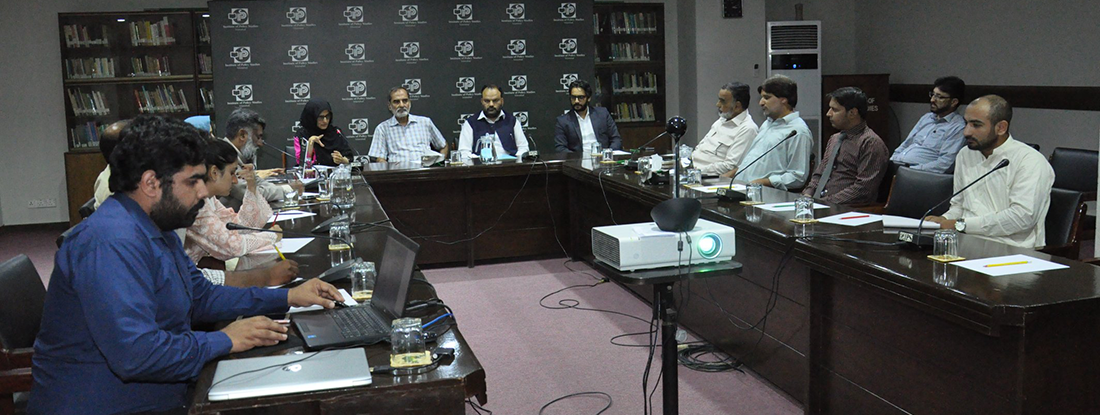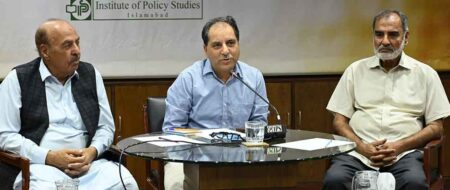Eleventh meeting of IPS-Working Group on Kashmir (IPS-WGK)
Law experts partaking in the eleventh meeting of IPS’
Working Group on Kashmir (IPS-WGK) unanimously termed better selection of legal
provisions and forums, improved use of language and relevant terminologies, and
cases backed by facts and figures crucial for presenting the Kashmir case
cogently in the evolving global environment.
Chaired by IPS’ Executive President Khalid Rahman and addressed as keynote
speaker by Dr Muhammad Mushtaq Ahmad, director general, Shari’ah Academy,
International Islamic University, Islamabad (IIUI), the sitting held on
September 17, 2020 was also partaken by Farzana Yaqoob, IPS associate and
general secretary IPS-WGK, Amb (r) Syed Ishtiaq Hussain Andrabi, Amb (r)
Tajammul Altaf, Amb (r) Syed Abrar Hussain, Brigadier (r) Said Nazir Mohmand,
Raja Sajjad Khan, director, Jammu & Kashmir Liberation Cell (JKLC), and
Advocate Nasir Qadri, international law expert from Legal Forum for Oppressed
Voices of Kashmir (LFOVK), among others.
Dr Mushtaq Ahmed, in his keynote speech, stated that global powers have been
playing with international law and its legal provisions by using the loopholes
within to their advantage, at times even setting up narratives emphatically to
suit their interests and then taking them back when their need was over. There
was a time in the 1960s, for instance, when terms like liberation or the right
of self-determination were being used reverently. The changes in their
priorities, however, saw considerable shifts being made to these perceptions
over time, not least after the 9/11 incident following which the same freedom
fighters were now being seen as terrorists.
The speaker, however, pointed out that while all these modifications and
alterations within international laws, rules and regulations have given space
to many ambiguities and double standards, they have also paved the way for the
creation of new legal avenues and options. The need is now for Pakistan to stay
abreast with these developments and make use of opportunities coming forth in
the ever-evolving global milieu.
Regarding legal options for Pakistan, the speaker stressed the need to
establish that the issue of Kashmir is a case of occupation whereas India is
the occupying power. Hence the matter should be seen in the light of legal
provisions and limitations available in the Geneva Convention, according to
which any steps like illegal occupation, demographic changes, domicile law,
custodial killings, unilateral abrogation of articles e.g. 35-A and 370, and
any consequent status quo changes would be seen as a crime.
It should also be established, he emphasized, that though Pakistan neither
recognizes Articles 35-A and 370 or their application, nor its standpoint is
dependent on these illegal provisions, their abrogation – following which the
occupied state has now become an annexed state – has only worsened the
situation for Kashmiris.
The speaker also advised Pakistan to consider making use of some provisions of
the International Court of Justice (ICJ) as it can help create significant
pressure on India. He said though pursuing a case in ICJ demands consent from
all parties concerned besides requiring a lot of time and resources, there are
no compulsions or major obstructions in taking an advisory opinion from the
forum. According to the statute of the UN organ, it can give opinion about any
questions asked as long as the inquiries are within its given mandate.
A relevant example in this regard occurred in 2003, the speaker added, when ICJ
gave an advisory opinion on the legality of construction of a wall in the
occupied Palestinian territory. Attempts were made by the US and its allies to
stop this issue from being raised in the UN General Assembly, but since UNGA
does not have a veto system, a resolution was passed by a majority to ask ICJ about
the legal consequences of such an occurrence. The ICJ, in response, reaffirmed
in its judgement that all those areas including Jerusalem, which were occupied
by Israel in 1967, fall in the category of occupied territories, and there will
be legal consequences as per occupation laws, human rights laws and the laws of
armed conflict if the occupying power tries to build a wall in these areas.
The speaker opined that Pakistan, too, could consider taking a similar path
instead of taking the case to ICJ directly, albeit admitting that such a
measure would require a lot of lobbying to garner sufficient international
support.
The panelists acknowledged the points raised by Dr Mushtaq Ahmed, emphasizing
that law fare experts in the country need to consolidate and unify their
efforts if they are to pursue the matter effectively on the international
stage. They said that while those in Pakistan look at all these issues from
their viewpoint, the West looks at the same problems through its own prism. The
need now is to find a convergence point, which can only be done by presenting
our case before the world as effectively and as cogently as possible.












